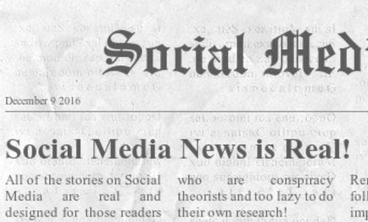
The verbal rumor was probably around when collective man originated. And, the written falsehoods possibly became part of the written word shortly after Gutenberg invented moveable type. But now we are in an entirely different time and social media allows not only immediate dissemination of information, but is also global in its reach. And, it is just as likely as not to be either completely wrong or dangerous.
The most recent shooting at the pizzeria in the Washington Post was based on a Twitter story alleging that Hillary Clinton was involved in a sex-slave plot and could have been deadly. An excerpt from the Post:
"Family and friends said they are struggling to understand how Welch apparently became so fixated on a fake news story that he drove from North Carolina with a Colt long rifle, a .38-caliber revolver and a shotgun, determined to take action. The viral Internet tale, which emerged shortly before the presidential election, falsely linked Hillary Clinton, her campaign chairman and the owner of Comet [The Pizza Shop] to the alleged sex-slave conspiracy".
Clearly, anyone has the right to propagate whatever opinion and fact that they have in a democratic society. And, the First Amendment prohibits me from disallowing this freedom. But, many of those who post damaging and harmful content have to be aware that with that right comes responsibility.
Not only the person who writes some story designed to either disrupt or cause danger needs to be held to some reasonable account of their actions, but those who spread the fake news are also responsible. And lest you think that these tweets or Face book "news" stories and re-tweets come from some disillusioned conspiracy theorist sitting in the safety of an anonymous existence consider the fact that Trumps nominee for National Security Advisor, General Michael Flynn, re-tweeted the false story about Hillary Clinton. From Fortune:
"On Twitter in particular, Flynn has not been shy about holding forth about Muslims, terrorism, and Hillary Clinton. And in several cases he has shared fake news stories about those subjects".
So, the trends are clear enough. Fake news is everywhere and it travels at the speed of the internet. The only answer that I can offer is that it is imperative that we research any story written anywhere before believing that it is real. Since it is difficult to find the sources of these stories it is apparently alright to yell fire in a crowded theater even when there is no fire. Unfortunately, if we don't verify and re-tweet a bogus story, somebody may get trampled to death...

 RSS Feed
RSS Feed
